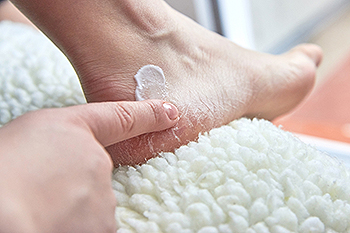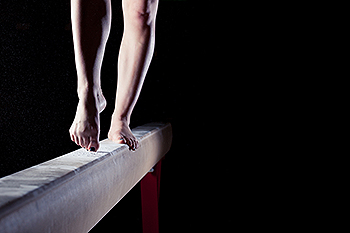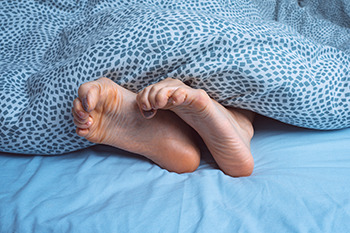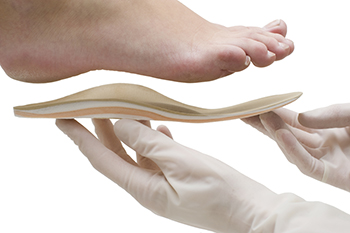January 2023
Dealing With Painful Heel Fissures

Cracked heels can develop into fissures that become both painful and potentially dangerous. A fissure is a deep crack in the skin of the heel, usually caused by a lack of moisturization. Some conditions can contribute to the formation of heel fissures, including living in a dry climate, frequently wearing open-backed shoes, walking barefoot, and being overweight. Certain underlying medical problems, such as diabetes and hypothyroidism, also may be causes of heel fissures. Because open crevices in the skin can invite bacterial infection, it is essential to deal with heel fissures as soon as possible. Applying good-quality moisture creams or lotions several times a day and covering the feet with socks can speed up the healing process. People with diabetes, poor circulation, or auto-immune deficiency would be wise to consult a podiatrist for help with eliminating heel fissures in a safe and timely fashion.
Cracked heels are unsightly and can cause further damage to your shoes and feet. If you have any concerns, contact Dr. Robert Graser from Graser Podiatry and Bunion Surgery Institute. Our doctor can provide the care you need to keep you pain-free and on your feet.
Cracked Heels
Cracked heels appear unappealing and can make it harder for you walk around in sandals. Aside from looking unpleasant, cracked heels can also tear stockings, socks, and wear out your shoes. There are several methods to help restore a cracked heel and prevent further damage.
How Do You Get Them?
Dry skin is the number one culprit in creating cracked heels. Many athletes, walkers, joggers, and even swimmers suffer from cracked heels. Age and skin oil production play a role to getting cracked heels as well.
Promote Healing
Over the counter medicines can help, especially for those that need instant relief or who suffer from chronic dry feet.
Wear Socks – Wearing socks with medicated creams helps lock in moisture.
Moisturizers – Applying both day and night will help alleviate dryness which causes cracking.
Pumice Stones – These exfoliate and remove dead skin, which allows for smoother moisturizer application and better absorption into the skin.
Change in Diet
Eating healthy with a well-balanced diet will give the skin a fresh and radiant look. Your body responds to the kinds of food you ingest. Omega-3 fatty acids and zinc supplements can also revitalize skin tissue.
Most importantly, seek professional help if unsure how to proceed in treating cracked heels. A podiatrist will help you with any questions or information needed.
If you have any questions, please feel free to contact our office located in Boerne, . We offer the newest diagnostic and treatment technologies for all your foot care needs.
Ways to Prevent Ankle and Foot Injuries in Gymnastics

Ankle and foot injuries are common among gymnasts. This makes sense given that this sport has so many high-impact moves and repetitions. With early specialization, year-round training, and younger people doing gymnastics, injuries can be more common than need be. Young gymnasts may not be developed enough to have the physical preparation to protect their ankle joints and open growth plates cause more injuries to happen to them. Proper progression of exercise, coaching, and conditioning before workouts, can reduce injuries in this sport. Strength training, including lifting weights, can be helpful in handling high-impact forces. Adopting science-based landing mechanics using a squat-based landing with feet and hips wide apart can also dissipate high-force impacts. If you or your child participates in gymnastics, it might be beneficial to speak to a podiatrist to learn more about reducing injuries before participating in this activity.
Ankle and foot injuries are common among athletes and in many sports. They can be caused by several problems and may be potentially serious. If you are feeling pain or think you were injured in a sporting event or when exercising, consult with Dr. Robert Graser from Graser Podiatry and Bunion Surgery Institute. Our doctor will assess your condition and provide you with quality foot and ankle treatment.
Common Injuries
The most common injuries that occur in sporting activities include:
- Achilles Tendonitis
- Achilles Tendon Rupture
- Ankle Sprains
- Broken Foot
- Plantar Fasciitis
- Stress Fractures
- Turf Toe
Symptoms
Symptoms vary depending upon the injury and in some cases, there may be no symptoms at all. However, in most cases, some form of symptom is experienced. Pain, aching, burning, bruising, tenderness, tightness or stiffness, sensation loss, difficulty moving, and swelling are the most common symptoms.
Treatment
Just as symptoms vary depending upon the injury, so do treatment options. A common treatment method is known as the RICE method. This method involves rest, applying ice, compression and elevating the afflicted foot or ankle. If the injury appears to be more serious, surgery might be required, such as arthroscopic or reconstructive surgery. Lastly, rehabilitation or therapy might be needed to gain full functionality in the afflicted area. Any discomfort experienced by an athlete must be evaluated by a licensed, reputable medical professional.
If you have any questions, please feel free to contact our office located in Boerne, . We offer the newest diagnostic and treatment technologies for all your foot care needs.
Reasons for Foot Cramps

Any kind of foot cramp usually grabs our attention, mainly because it interferes with carrying out the activities of the day. If foot cramps start to become an ongoing occurrence, it may be a good idea to question why they are happening. One common cause of foot cramps is wearing shoes that are too tight. The reason is likely to be that blood circulation to the feet is being blocked. Cramps in the feet may also be the result of dehydration, which keeps the muscles from getting the water they need to function properly. This may be caused by an underlying condition or an infection. Overdoing exercise may result in foot cramps as the feet work extra hard to maintain your balance. Athletes, dancers, and workers who stand for long periods may experience this reaction. Among the other possible causes of foot cramps are pregnancy, low levels of electrolytes and other minerals, and nerve damage. If foot cramps become more frequent or severe, it is a good idea to visit a podiatrist who can determine the cause and offer ways to prevent or lessen them.
Foot Pain
Foot pain can be extremely painful and debilitating. If you have a foot pain, consult with Dr. Robert Graser from Graser Podiatry and Bunion Surgery Institute. Our doctor will assess your condition and provide you with quality foot and ankle treatment.
Causes
Foot pain is a very broad condition that could be caused by one or more ailments. The most common include:
- Bunions
- Hammertoes
- Plantar Fasciitis
- Bone Spurs
- Corns
- Tarsal Tunnel Syndrome
- Ingrown Toenails
- Arthritis (such as Gout, Rheumatoid, and Osteoarthritis)
- Flat Feet
- Injury (from stress fractures, broken toe, foot, ankle, Achilles tendon ruptures, and sprains)
- And more
Diagnosis
To figure out the cause of foot pain, podiatrists utilize several different methods. This can range from simple visual inspections and sensation tests to X-rays and MRI scans. Prior medical history, family medical history, and any recent physical traumatic events will all be taken into consideration for a proper diagnosis.
Treatment
Treatment depends upon the cause of the foot pain. Whether it is resting, staying off the foot, or having surgery; podiatrists have a number of treatment options available for foot pain.
If you have any questions, please feel free to contact our office located in Boerne, . We offer the newest diagnostic and treatment technologies for all your foot care needs.
Orthotics for Football Players

Many individuals who are not well-versed in podiatry might not be familiar with what orthotics are. Essentially, orthotics are inserts that can be worn in shoes. Orthotics are either custom-made for an individual’s unique foot shape or are over-the-counter. The purposes of using orthotics can vary, but they primarily consist of correcting deformities and providing support to the feet. Athletes are a group of individuals that might be particularly benefited from the use of orthotics. Football players especially might stand to benefit from wearing orthotic devices. This is because football players can benefit from extra support for lateral movements, such as sprinting or running. Orthotic devices can provide football players with precisely this kind of support for lateral movements. If you are someone who engages in football and is looking for ways to protect your feet, contact a podiatrist today.
If you are having discomfort in your feet and would like to try orthotics, contact Dr. Robert Graser from Graser Podiatry and Bunion Surgery Institute. Our doctor can provide the care you need to keep you pain-free and on your feet.
What Are Orthotics?
Orthotics are inserts you can place into your shoes to help with a variety of foot problems such as flat feet or foot pain. Orthotics provide relief and comfort for minor foot and heel pain but can’t correct serious biomechanical problems in your feet.
Over-the-Counter Inserts
Orthotics come in a wide variety of over-the-counter inserts that are used to treat foot pain, heel pain, and minor problems. For example, arch supports can be inserted into your shoes to help correct overarched or flat feet, while gel insoles are often used because they provide comfort and relief from foot and heel pain by alleviating pressure.
Prescription Orthotics
If over-the-counter inserts don’t work for you or if you have a more severe foot concern, it is possible to have your podiatrist prescribe custom orthotics. These high-quality inserts are designed to treat problems such as abnormal motion, plantar fasciitis, and severe forms of heel pain. They can even be used to help patients suffering from diabetes by treating foot ulcers and painful calluses and are usually molded to your feet individually, which allows them to provide full support and comfort.
If you are experiencing minor to severe foot or heel pain, it’s recommended to speak with your podiatrist about the possibilities of using orthotics. A podiatrist can determine which type of orthotic is right for you and allow you to take the first steps towards being pain-free.
If you have any questions please contact our office located in Boerne, . We offer the newest diagnostic and treatment technologies for all your foot and ankle needs.
How Tight Should You Tie Your Shoes?

One rite of passage into young adulthood is learning how to tie one’s shoes without any help. However, when it comes to running shoes, many runners are unsure about how tight one ought to tie their laces when lacing up running shoes. Although everyone’s needs will be slightly different, one important rule of thumb to keep in mind is that the shoes ought to fit snugly against the feet. However, the laces should not be tied so that the shoe is resting tightly against the foot. Selecting a running shoe involves making many important decisions, and the laces are just one kind of decision. If you are a runner and want to make sure that you are doing all that you can to select the correct running shoe and are tying the laces correctly, contact a podiatrist today. By scheduling an appointment, you can help ensure that you are receiving the guidance you need to protect your feet.
Finding a properly-fitting shoe is important in reducing injuries and preventing foot problems. For more information about treatment, contact Dr. Robert Graser from Graser Podiatry and Bunion Surgery Institute. Our doctor will treat your foot and ankle needs.
Proper Shoe Fitting
A common concern when it comes to foot health, having properly fitted shoes can help prevent injuries to the foot. Out feet affect our posture and gait, which in turn affects the biomechanics and overall bodily structure. With 33 joints, 26 bones, and over 100 ligaments, the potential for serious injury is much greater than one realizes. Although the feet cease growth in adulthood, they still change shape as they mature. Here are some factors to consider when it comes to investing in proper fitting shoes:
- Be sure the shoes fit correctly right away
- Ensure the ball of your foot fits comfortably in the widest portion of the shoes
- Even though they may look fashionable, improper fitting shoes can either create adverse conditions or exacerbate existing ones you may already have
- Walk along a carpeted surface to ensure the shoes comfortably fit during normal activity
Keeping in mind how shoes fit the biomechanics of your body, properly-fitting shoes are vitally important. Fortunately, it is not difficult to acquire footwear that fits correctly. Be sure to wear shoes that support the overall structure of your body. Do your feet a favor and invest in several pairs of well-fitted shoes today.
If you have any questions please feel free to contact our office located in Boerne, . We offer the newest diagnostic and treatment technologies for all your foot and ankle needs.
Blog Archives
- July 2024
- June 2024
- May 2024
- April 2024
- March 2024
- February 2024
- January 2024
- December 2023
- November 2023
- October 2023
- September 2023
- August 2023
- July 2023
- June 2023
- May 2023
- April 2023
- March 2023
- February 2023
- January 2023
- December 2022
- November 2022
- October 2022
- September 2022
- August 2022
- July 2022
- June 2022
- May 2022
- April 2022
- March 2022
- February 2022
- January 2022
- December 2021
- November 2021
- October 2021
- September 2021
- August 2021
- July 2021
- June 2021
- May 2021
- April 2021
- March 2021
- February 2021
- January 2021
- December 2020
- November 2020
- October 2020
- September 2020
- August 2020
- July 2020
- June 2020
- May 2020
- April 2020
- March 2020
- February 2020
- January 2020
- December 2019
- November 2019
- October 2019
- September 2019
- August 2019
- July 2019
- June 2019
- May 2019
- April 2019
- March 2019
- February 2019
- January 2019
- December 2018
- November 2018
- October 2018
- September 2018
- August 2018
- July 2018
- June 2018
- May 2018









